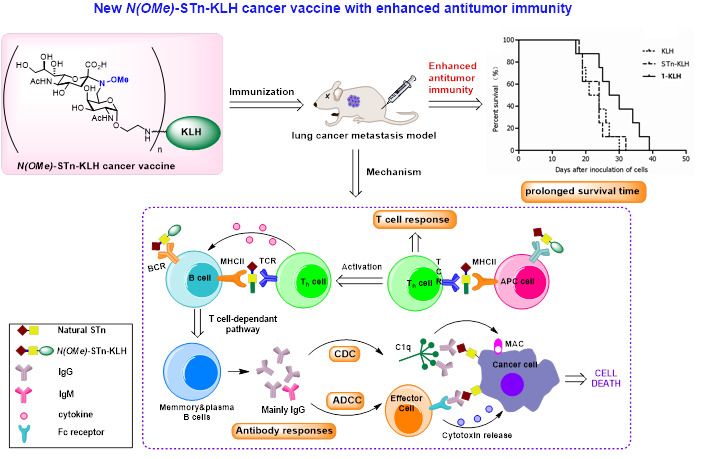A chemically modified STn glycoconjugate vaccine with enhanced antitumor immunity
Published 19 September, 2025
Cancer vaccines hold potential for cancer prevention and treatment. In particular, tumor-associated carbohydrate antigens (TACAs), which are overexpressed on the surface of cancer cells, are correlated with tumor cell adhesion and metastasis, and therefore regarded as important targets for cancer vaccine development. However, TACAs are usually T-cell independent antigens and unable to evoke powerful immune response to eradicate cancers due to their poor immunogenicity. To that end, using an approach that is based on the modification of carbohydrate antigen structures (MCAS) offers an attractive strategy to break the immune tolerance and enhance the immunogenicity. Against this backdrop, a new type of carbohydrate cancer vaccines based on antigen modification have been designed, synthesized and evaluated.
Novelty: A new study published in the KeAi journal Glycoscience & Therapy introduces a chemical modification approach to sialyl-Tn (STn) vaccine design by replacing the natural, enzymatically labile O-glycosidic linkage with a synthetic N(OMe)-glycosidic bond. This modification represents a marked improvement of existing clinical candidates like Theratope®. Unlike conventional modifications that focus solely on acyl group alterations, the proposed approach targets the glycosidic linkage itself—a vulnerability in native STn antigens—to simultaneously enhance metabolic stability and immunogenic potency.
The resulting N(OMe)-STn conjugate demonstrates substantial resistance to enzymatic degradation while retaining structural authenticity necessary for cross-reactive immunity. Furthermore, through screening the N(OMe)-STn–KLH conjugate was found to be the optimal immunoge.
Significance: The development of an effective STn-based vaccine is particularly applicable for aggressive carcinomas expressing this antigen. The failure of earlier vaccines like Theratope® underscores the need for strategies that overcome immune tolerance and induce robust, durable T-cell-dependent response
The new N(OMe)-STn–KLH vaccine directly addresses these limitations by eliciting exceptionally high and cross-reactive IgG antibody titers against native STn, activating potent Th1/Th2-balanced T-cell responses, and mediating antitumor effects including prolonged survival and reduced metastasis in vivo.
Further, the vaccine induces functional antibodies capable of initiating both CDC and ADCC against STn-positive tumor cells.
In sum, this approach not only provides a promising candidate for further development against STn-expressing cancers, but also establishes a generalizable MCAS strategy—modification at the glycosidic linkage—that could be applied to other TACAs.

Contact author:
Xin-Shan Ye, State Key Laboratory of Natural and Biomimetic Drugs, School of Pharmaceutical Sciences, and Chemical Biology Center, Peking University, Xue Yuan Rd No. 38, Beijing 100191, PR China, xinshan@bjmu.edu.cn
Funder:
This work was financially supported by the National Key Research and Development Program of China (Grant No. 2022YFC3400800), and National Natural Science Foundation of China (Grant Nos. 22237001, 21738001).
Conflict of interest:
X.-S. Y., C.-X. H., and X.-J. Z. have applied for a Chinese patent filed by Peking University. The other authors declare no competing interests.
See the article:
A cancer vaccine based on N-linked sialyl-Tn antigen elicits robust and selective antitumor immunity, Glycoscience & Therapy, DOI: 10.1016/j.glycos.2025.100006